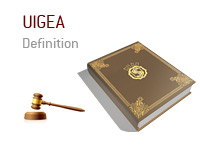Definition of UIGEA
The Unlawful Internet Gambling Enforcement Act of 2006, or UIGEA for short, is US legislation that regulates gambling online. Congress amended it to the SAFE Port Act, which provides increased regulation for port security.
The UIGEA "prohibits gambling businesses from knowingly accepting payments in connection with the participation of another person in a bet or wager that involves the use of the Internet and that is unlawful under any federal or state law." However, it specifically excludes legal intrastate and intertribal gambling as well as most fantasy sports.
 Prior to the UIGEA, there was no clear rule to whether online gambling was legal in the US. This ambiguity meant that federal and state governments had very little control. The online gambling houses, however, had a great deal.
Prior to the UIGEA, there was no clear rule to whether online gambling was legal in the US. This ambiguity meant that federal and state governments had very little control. The online gambling houses, however, had a great deal.Not all were in favor of the UIGEA, and it met with a great deal of criticism.
Some criticized attaching it to the SAFE Port Act while others likened it to the prohibition of alcohol. Many argued that rather than stop online gambling in the US it would simply open the doors for smaller unscrupulous operations.
The impact of the UIGEA was significant and immediate. Gamblers in the US have lesser access and security. Gambling businesses worldwide have a smaller client base, and many went out of business due to the loss of profit.
Since the UIGEA passed, there has been a strong political movement within the US to undo it. Unfortunately, for those who wish to see it gone, the current economic climate has pushed this movement to the backburner.
--
Recent Articles That Include The Term UIGEA:
So Close! 2022 World Series of Poker Main Event Barely Misses Attendance Record
What Is The Record for Most Entrants in The World Series of Poker Main Event?
15th Anniversary of Pokerstars' Sunday Million Set For Sunday
Should Isai Scheinberg Be In the Poker Hall of Fame?
Parent Company of Pokerstars Taken Aback By Kentucky Supreme Court Ruling
Back to the - Poker Dictionary

